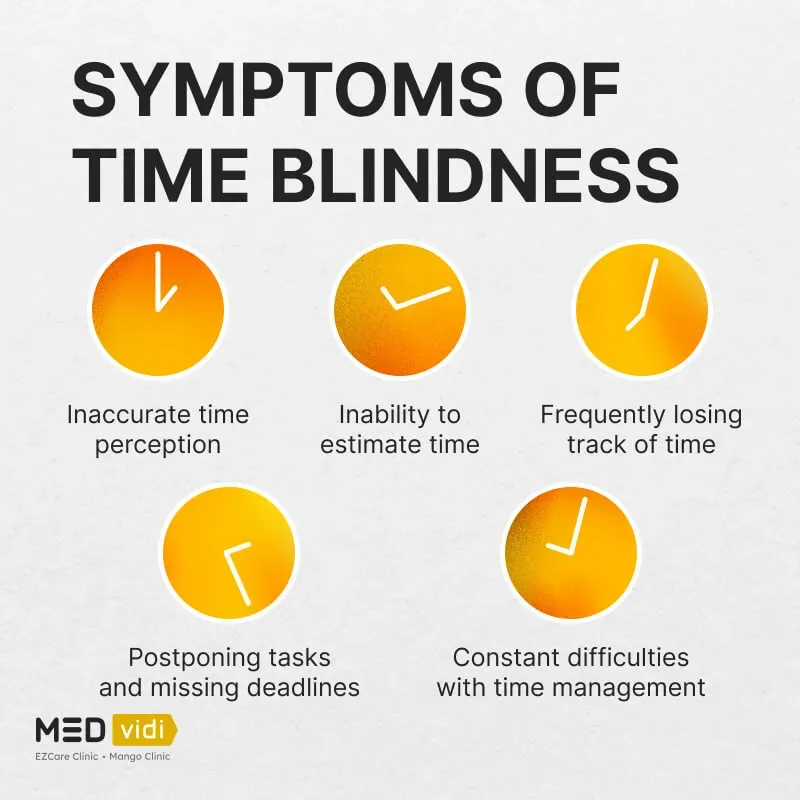Time blindness is a condition that can significantly impact a person’s ability to manage their daily tasks and interactions. Often misunderstood, it is frequently linked to chronic lateness and can be particularly prevalent among individuals with ADHD. This phenomenon occurs when someone struggles to accurately gauge the passage of time, leading to difficulties in time management and execution of tasks due to impaired executive function. As a result, the individual may frequently underestimate how long activities will take, causing stress not only for themselves but also for those waiting for them. By understanding time blindness as a mental health concern, we can foster better support mechanisms for those affected.
Also referred to as time agnosia, time blindness encompasses more than just a lack of awareness regarding time; it reflects deeper cognitive challenges faced by individuals. This phenomenon is often seen in people with ADHD, as their executive function capabilities may hinder effective planning and prioritization. Time perception issues can affect various aspects of life, including personal relationships and professional responsibilities. By exploring the nuances of this condition, we can better appreciate the profound effects it has on our daily lives and the importance of developing practical strategies for managing it.
Understanding Time Blindness: The Hidden Struggle Behind Chronic Lateness
Time blindness is a condition that affects an individual’s perception of time, leading to chronic lateness and missed deadlines. Unlike mere tardiness, which is often attributed to a lack of care or motivation, time blindness is deeply rooted in neurological and cognitive issues, particularly executive function disorders like ADHD. Individuals suffering from this condition often miscalculate how much time is required for various tasks, resulting in frustration and social repercussions.
This phenomenon can severely impact mental health by contributing to stress and anxiety. When people with time blindness consistently arrive late or struggle to manage their schedules, they can feel overwhelmed by the pressure to meet expectations and deadlines. This can lead to a cycle of negative self-perception and poor mental well-being, emphasizing the need for increased awareness and understanding of the underlying issues contributing to these challenges.
The Executive Function Connection: Time Blindness and ADHD
Time blindness is often associated with executive function deficits, particularly in individuals with ADHD. Executive functions are crucial for planning and organizing tasks, managing time effectively, and adapting to changing situations. Those with ADHD may struggle more than others to allocate their time correctly, leading to chronic lateness and difficulty transitioning between activities. These impairments make it hard to estimate time accurately, which is a core component of effective time management.
As Dr. Mauran Sivananthan describes, ADHD affects several brain regions that are vital for processing time, including the prefrontal cortex. By understanding this connection, individuals can better approach their daily routines. Incorporating strategies that support executive function, such as using visual timers or establishing structured schedules, can significantly help those with ADHD navigate their challenges with time blindness.
The Social Impacts of Time Blindness and Chronic Lateness
Chronic lateness resulting from time blindness can have profound social implications. Relationships with family, friends, and colleagues can suffer when someone frequently arrives late or misses important events. This behavior can be perceived as disrespectful or inconsiderate, leading to misunderstandings and conflicts. Social circles may grow increasingly frustrated, which can lead to isolation for the individual struggling with time perception.
Moreover, the stress of dealing with the repercussions of repeated tardiness can further exacerbate mental health issues. It’s essential for those affected to communicate openly about their struggles with time blindness to foster understanding and support within their social frameworks. By educating others about the condition, friendships and professional relationships can be strengthened, ultimately aiding in the healing process.
Strategies to Overcome Time Blindness
Addressing time blindness involves implementing various strategies that can help individuals manage their time more effectively. One effective approach is to utilize external tools such as timers, alarms, and planners that provide structure and aid in time estimation. Setting reminders for tasks and deadlines can help reduce the burden of time management, enabling individuals to stay organized and punctual.
Another beneficial strategy is to break down larger tasks into smaller, more manageable segments. This approach not only minimizes the overwhelming nature of significant projects but also improves focus and productivity, as it allows individuals to visualize progress in real-time. Establishing daily routines can also train the brain to anticipate the flow of the day, which can help combat the effects of time blindness.
Time Blindness and Mental Health: The Interconnectedness
The relationship between time blindness and mental health issues is further complicated by the reality that many individuals with this condition may also experience anxiety or depressive symptoms. The stress of chronic lateness and the feeling of inadequacy associated with unmet deadlines can lead to a negative spiral of mental health struggles. Understanding this connection is essential for developing comprehensive treatment approaches that address both time blindness and mental health.
Therapeutic interventions focusing on cognitive behavioral therapy (CBT) and mindfulness can help individuals manage anxiety related to time perception. By fostering skills that enhance executive function and time management, individuals can experience improvements in both their mental health and daily functionality. Support from therapists who understand the nuances of time blindness can be invaluable in helping individuals create effective coping strategies.
Cognitive Techniques for Better Time Management
Cognitive techniques play a crucial role in mitigating the effects of time blindness. Techniques such as visualization and mental rehearsal can help individuals prepare for upcoming tasks or events by mentally mapping out time allocation. By practicing these strategies, individuals can improve their ability to estimate how long tasks will take, which in turn can enhance their overall productivity and punctuality.
Additionally, utilizing cognitive behavioral strategies to disrupt the habitual patterns associated with poor time management can support individuals in developing healthier habits. For instance, individuals may benefit from reassessing their usual routines and replacing them with strategies that promote more effective time use. This cognitive shift can either directly reduce chronic lateness or prevent the manifestation of time blindness.
Building Routines to Combat Time Blindness
Establishing consistent routines is one of the most effective ways to combat time blindness. Routines provide a framework that can guide an individual throughout their day, enhancing predictability and stability. For those impacted by time blindness, creating a daily schedule can alleviate the cognitive burden of managing time and tasks, enabling them to focus more on execution rather than planning.
Moreover, consistent routines can also improve overall mental health by reducing decision fatigue and building a sense of accomplishment. As individuals complete tasks in a structured manner, they may also find it easier to gauge the time required for similar activities in the future, thereby addressing one of the core challenges of time blindness.
Utilizing External Time Management Tools
External tools such as digital calendars, reminder apps, and physical planners serve as critical aids in managing time effectively for individuals with time blindness. These resources can provide visual cues that offset the challenges posed by impaired time perception. By reinforcing systems of accountability and prompting necessary actions, these tools can assist individuals in staying on track with their commitments.
In addition, visual aids like wall clocks or countdown timers can enhance awareness of time passing. These external references allow individuals to physically see the time elapsed, which can reinforce time awareness and assist in effective task management. Utilizing these tools not only helps to mitigate the effects of time blindness but also empowers individuals to take control of their schedules.
Seeking Professional Guidance for Time Management Assistance
For many individuals struggling with time blindness, seeking professional guidance can be a game changer. Psychologists and behavior analysts can offer tailored strategies that address the complexities of the condition. They can help individuals identify triggers, develop coping mechanisms, and establish systematic approaches to enhancing time management skills.
In therapy, individuals can work on improving their executive function skills, which are essential for managing time effectively. By equipping themselves with the right tools and guidance, individuals can learn to navigate their daily challenges more effectively, allowing for improved productivity and reduced stress related to chronic lateness and time blindness.
Frequently Asked Questions
What is time blindness and how is it related to chronic lateness?
Time blindness is a condition where individuals struggle to perceive and manage time effectively. This often leads to chronic lateness, as those affected may underestimate how much time tasks will take, resulting in missed deadlines and social engagements.
How does ADHD contribute to time blindness?
ADHD, or attention deficit hyperactivity disorder, significantly impacts a person’s executive functions, including time management skills. Individuals with ADHD may find it challenging to gauge time intervals accurately, leading to time blindness and chronic lateness.
What are the main symptoms of time blindness?
Symptoms of time blindness include difficulty transitioning between tasks, underestimating task durations, and hyperfocus, where one becomes engrossed in an activity and loses track of time, contributing to chronic lateness.
Can executive function issues lead to time blindness?
Yes, time blindness is considered an executive function issue, impacting skills like working memory and cognitive flexibility. These deficits can hinder a person’s ability to plan and manage their time effectively.
Is time blindness associated with any mental health conditions?
Time blindness is often linked to various mental health conditions, including ADHD, autism, OCD, anxiety, and depression. Each of these can affect how individuals perceive and manage time, contributing to chronic lateness.
What strategies can help manage time blindness?
Strategies to manage time blindness include using timers and calendars, establishing consistent routines, breaking tasks into smaller steps, and maintaining a structured daily rhythm to improve time management and reduce chronic lateness.
Does time blindness have a formal diagnosis in mental health?
Currently, time blindness is not officially recognized in the DSM-5, but it is related to time perception issues addressed in ADHD criteria. This makes understanding and managing time blindness important for those with ADHD-related challenges.
Can visual aids help individuals with time blindness?
Yes, visual aids such as calendars and timers can significantly assist individuals in managing their time more effectively. By providing external reminders, these tools can help alleviate the symptoms of time blindness and reduce chronic lateness.
How can consistent routines improve time management for those with time blindness?
Consistent routines can create structure and predictability, which helps individuals with time blindness to better manage their time. This reduces decision fatigue and enhances productivity, ultimately addressing chronic lateness.
What role does therapy play in addressing time blindness?
Therapy can provide strategies and tools to individuals struggling with time blindness. Regular sessions can help reinforce time management techniques, improve executive functioning, and help individuals cope with the anxiety that may accompany chronic lateness.
| Key Aspect | Details |
|---|---|
| Definition | Time blindness is a health condition that affects a person’s perception of time, impacting their punctuality and productivity. |
| Misunderstandings | Often misinterpreted as laziness or carelessness, time blindness can be a serious mental health issue. |
| Impact on Daily Life | Leads to missed deadlines, difficulty transitioning tasks, and heightened stress. |
| Causes | Associated with executive function issues and commonly linked to ADHD and other mental health conditions. |
| Management Strategies | Using timers, establishing consistent routines, and breaking tasks into smaller parts can help manage time blindness. |
Summary
Time blindness significantly impacts an individual’s ability to manage their time effectively, often leading to chronic lateness and increased stress. Understanding time blindness as a genuine cognitive issue rather than mere carelessness can foster compassion and better management strategies for those affected. Through techniques such as setting timers, maintaining consistent routines, and utilizing external tools, individuals can improve their time management skills despite the challenges posed by this condition.



